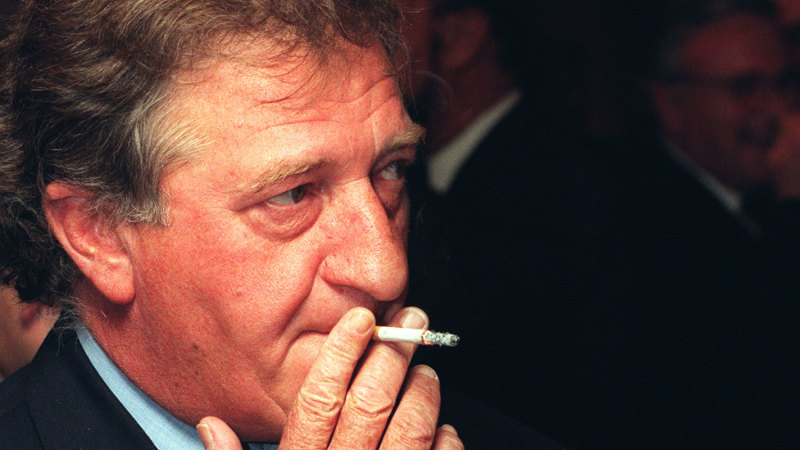Save articles for later
Add articles to your saved list and come back to them any time.
He was a larger than life Melbourne identity who made his name as a high-flyer in 1980s corporate Australia, but when John Elliott died he had only $6951 in an ANZ bank account and some furniture to his name.
Elliott died in 2021, aged 79, after a business career full of ups and downs in which he amassed an estimated fortune of $78 million and a place on the BRW Rich List before losing it all when he declared bankruptcy in 2005.
John Elliott after his bankruptcy ended. Credit: Craig Sillitoe
The one-time president of the Carlton Football Club and Liberal Party prime ministerial hopeful wrote his last will in 2019, appointing his son, 3AW radio presenter Tom Elliott, and daughter, businesswoman Caroline Elliott, as executors.
However, according to an inventory of assets filed in the Victorian Supreme Court, it appears there wasn’t much of an inheritance, as the fallen corporate takeover titan held no real estate and very little in cash at the time of his death.
Documents filed when Elliott’s will passed into probate in November last year show that his assets included $6951.77 in a bank account at ANZ’s Carlton branch, a private health insurance credit of $2413.95 and $2200 worth of furniture.
Carlton captain Stephen Kernahan with Elliott in 1988. Credit: Andrew De La Rue
Elliott’s last address was an apartment on Elgin Street in Carlton, which property records show was not owned by him.
Big Jack, as he was known, once held Melbourne’s property sale record, when he sold his six-bedroom Toorak mansion for $11 million in the early 2000s.
The largest asset listed in Elliott’s will was an $825,000 loan that he advanced to Ebek Pty Ltd, his family’s private company, which lists Caroline as its sole director.
The one liability was a loan of $163,471.72, which Elliott owed to his daughter.
Elliott (centre) with Prince Charles and Princess Diana at the Melbourne Cup in 1985.Credit: Bruce Postle
When asked if he was bequeathed anything else, Tom Elliott said he inherited his father’s tie collection, many of which had elephants on them. “There were hundreds of them,” Tom said.
Elliott was known for collecting elephants, a sign of good luck, which Tom said were also passed down.
It’s not clear if the children got much else aside from nicknacks and mementos. In his will, Elliott provides instructions for his former partner Joanne Hurley to have first priority of the estate – up to a sum of $280,000 – if he still owed money to her as part of a financial agreement from 2018.
While Elliott became one of the dominant figures in Australia’s corporate landscape in the 1980s, his personal fortunes never came close to his contemporaries, such as Robert Holmes a Court – who became Australia’s first billionaire – or even Alan Bond.
John Elliott’s former house on Towers Road in Toorak, which sold for a then-record $11 million.
The latter emerged from the largest personal bankruptcy in history in 1992 with a net worth of around $265 million in 2008.
Elliott controlled billions of dollars of assets, including one of the biggest brewers in the world with Foster’s the jewel in the crown, and had all the trappings of wealth. But his net worth was never more than $78 million.
His attempt to join Holmes a Court in the rarefied air of the truly rich, by seeking to take Elders IXL private, collapsed under the weight of the company’s debt.
Legal battles with corporate regulators, and divorces, took their toll on his wealth. Elliott declared himself bankrupt in 2005.
Elliott with his son Tom, doing their regular spot on 3AW Radio in 2015.Credit: Luis Ascui
Reports from that time showed the key role played by Ebek, which was owned by the Elliott family trust. When Elliott sold $1 million worth of antique silver, furniture and lithographs the previous year, his entire share of the proceeds – about $400,000 – was paid to Ebek creditors.
This infuriated his personal creditors, who voted against Elliott’s proposal to avoid bankruptcy by paying them 5c for every dollar owed on debts totalling $9.24 million.
They received just 2.3c for every dollar owed after his bankruptcy. Bond’s creditors were offered just 0.5c for every dollar owed.
Elliott’s offer to creditors included a $300,000 cash contribution from Ebek, which owed Elliott $621,000 at the time.
Elliott and Robert Holmes a Court in 1986. Credit:
A 2004 report from the administrators of failed rice miller Water Wheel Holdings – which Elliott was involved with – said Ebek’s main asset was the southern NSW homestead Woorooma Station.
It was valued at $1 million but heavily mortgaged.
Bond also died with little to his name, but there were suspicions about what was held in a series of family trusts.
“I can confirm, as executor of Dad’s estate, that there absolutely zero funds for distribution and a mass of debts that I am still in the process of tallying,” Bond’s daughter Jody Fewster said in relation to the bankruptcy of her brother Craig in 2016.
Elliott, Carlton football president and Elders IXL boss, in 1985.Credit: The Age
Elliott always hoped to chart a return to the top of the business world after his bankruptcy, but was never able to manage it.
As Elliott himself once put it: “Life comes in waves, doesn’t it?”
The Morning Edition newsletter is our guide to the day’s most important and interesting stories, analysis and insights. Sign up here.
Most Viewed in National
From our partners
Source: Read Full Article









